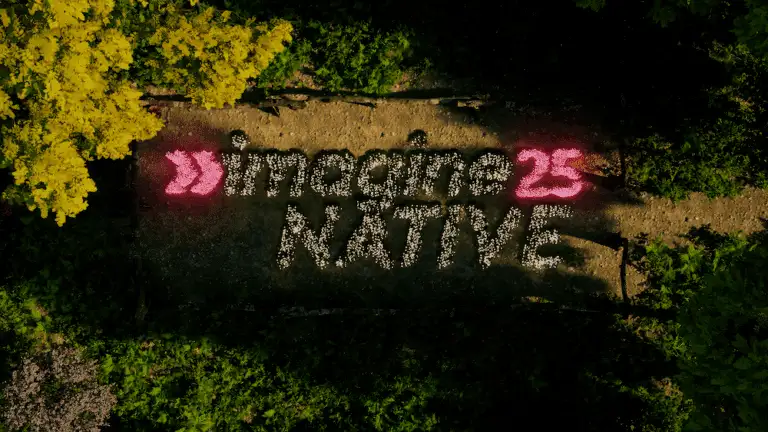Top 5 Films to Watch at imagineNATIVE 2025

Celebrating 25 years of showcasing the very best Indigenous talent in film and media arts from around the world, imagineNATIVE 2025 has programmed works spanning 55 Indigenous nations from 16 countries.
After so many years of stories being silenced, imagineNATIVE offers a tremendous opportunity to amplify Indigenous voices and to reach both Indigenous and non-Indigenous audiences. While many of the selected films hail from Canada, the festival also features creators from across the globe, providing a chance to learn from diverse Indigenous perspectives. imagineNATIVE 2025 runs in Toronto from June 3–8, 2025, and continues online from June 9–15, 2025.
Below are the five most anticipated titles of this year’s festival – works that range from genre thrillers to urgent documentaries, each offering a distinct lens on Indigenous experiences. Whether you’re attending in person or tuning in virtually, these are some of the films worth watching.
5. Seeds
Director:
Kaniehtiio Horn
What It’s About (from imagineNATIVE):
Kaniehtiio Horn’s Seeds is a sharp, unsettling thriller and black comedy that probes deeply into Indigenous anxieties. Horn, serving as writer, director, and star, weaves a taut narrative around Ziggy, a Toronto bike courier and emerging influencer who is drawn back to her community and into the orbit of a suspicious seed company, Nature’s Oath. By blending familiar thriller tropes with the specific suspicions of Indigenous communities, the film explores the fraught relationship between land, reproduction, and corporate exploitation. The creeping dread builds against a remote setting, as increasingly strange happenings orbit around Ziggy’s aunt’s house and the seeds she is entrusted to protect. Horn skillfully incorporates Kanienʼkehá:ka perspectives into the story, creating a film that thrills while resonating on a deeper cultural level. Dark humour and genre subversion combine with a distinctly Mohawk lens.
My Thoughts on Seeds:
Kaniehtiio Horn’s Seeds captures something I haven’t quite seen on screen before: the tension of living between the digital present and ancestral memory. Framed loosely as a “home invasion comedy,” the film flirts with genre tropes – gore, action, absurd humour – but what lingers is its deeper current: a portrait of urban Indigenous identity, constantly pulled between the immediacy of social media and the enduring presence of the land. As someone who used to teach about Horn and her sister during lessons on the Oka Crisis, there’s something quietly powerful about seeing her take control of the narrative now, as a filmmaker. Seeds isn’t without its rough patches, but it holds together – offering enough story, enough stakes, and a strong sense that Horn is just getting started.
What Others Are Saying:
“Beyond the buckets of blood and eco-friendly messaging, there is much that’s more profound the closer one looks.” – Jason Gorber, Collider
Tickets for Seeds:
4. The Haka Party Incident
Director:
Katie Wolfe
What It’s About (from imagineNATIVE):
This candid documentary revisits the three-minute “haka party” at the University of Auckland that ignited race relations between Māori and non-Māori in 1970s New Zealand. Through contemporary interviews with former engineering students who participated in the mocking haka and members of the activist group He Taua who disrupted it, the film reconstructs multiple perspectives on the event. Directed by Katie Wolfe (Ngāti Mutunga, Ngāti Tama, Ngāti Toa Rangatira) of 2017’s Waru, originally a theatre piece, this is the definitive cinematic telling of that true story. Archival footage from the era – waka-rafting clips, news broadcasts, and footage from the University of Auckland’s anti-racism forum – intersects with four-decade-later reflections, revealing how memory and history intertwine. Wolfe’s previous short, Redemption, won Best Short Drama and the Emerging Talent Award at imagineNATIVE in 2011. This marks her first feature-length documentary.
My Thoughts on The Haka Party Incident:
The Haka Party Incident is an essential documentary for anyone interested in the legacies of colonialism outside of North America. Coincidentally, like with Kaniehtiio Horn and Seeds, I often included the Māori people and the haka specifically as key examples of cultural revitalization and Indigenous resistance during my career as a teacher. What The Haka Party Incident does is add the vital history that rarely enters our public consciousness. While the haka itself has become globally recognizable, especially through sport, this film reminds us of the deeper history behind it: the struggle, the silencing, and the strength of the Māori people. Blending archival footage with contemporary interviews, it offers a reflective, layered experience that connects past and present. I haven’t seen the play that inspired it, but the film has sparked a real desire to do so.
What Others Are Saying:
“There’s striking images of haka parties throughout the ’70s, news interviews from 1979 with He Taua members and footage from the University of Auckland forum on racism shortly after the incident. Seeing such footage played against the reflections of the subjects four decades later is the beauty of documentary.” – Madeleine Chapman, The Spinoff
Tickets for The Haka Party Incident:
3. Remaining Native
Director:
Paige Bethmann
What It’s About (from imagineNATIVE):
Paige Bethmann’s debut Remaining Native is a vital, unflinching documentary that follows runner Kutoven Stevens – known as Ku – on his journey from a small Nevada town to an out-of-state university. Through a masterful blend of voiceover and interview, Bethmann examines the significance behind Ku’s decision to honour his ancestors’ survival of the boarding school system through his dedication to running. Rather than offering easy answers, the film presents a deeply human portrait of Indigenous individuals navigating the complexities of heritage in a world that often seeks to erase them. It testifies to the strength of community, the fight to preserve cultural identity, and the search for healing. Winner of SXSW’s Audience Award and Special Jury Award for Best Documentary, Remaining Native is essential viewing for its portrait of the lived realities of Indigenous people today. Bethmann – a Haudenosaunee woman and first-time feature filmmaker based in Reno, Nevada – brings over a decade of nonfiction experience to her feature debut.
My Thoughts on Remaining Native:
I missed Remaining Native at SXSW earlier this year, so I was grateful to see it included in imagineNATIVE’s lineup. Perhaps it’s my own background as a competitive runner, but I felt an immediate connection to Ku – watching him run feels not just physical, but emotional. His reflections on his great-grandfather, Frank Quinn, who once ran from a boarding school, echo stories we’ve heard in Canada – Chanie Wenjack among them – and lend the film a quiet, cross-border resonance. The act of running becomes metaphor: Ku runs from place, from pain, from expectations. But what the film captures beautifully is the moment when running shifts from escape to endurance. This is a thoughtful portrait of a young man navigating a complicated identity, and the strength it takes to stop running and face what lies ahead.
What Others Are Saying:
“Director Paige Bethmann’s technically polished and utterly absorbing film skillfully forges a link between past and present.” – Joe Leydon, Variety
Tickets for Remaining Native:
2. We Were Dangerous
Director:
Josephine Stewart-Te Whiu
What It’s About (from imagineNATIVE):
Josephine Stewart-Te Whiu’s We Were Dangerous is a potent drama set against the stark backdrop of a 1954 New Zealand reform school. The film tells of Nellie and Daisy, two young women seeking escape from a system intent on breaking them. The arrival of Lou adds complexity to their bond as they navigate the oppressive regime of a strict matron and endure unsettling nighttime punishments. Stewart-Te Whiu – Ngāpuhi/Te Rarawa – embraces darkness but also leans into moments of joy and absurdity as these three women face systemic injustice. The film pulses with a quiet rage, testifying to the enduring power of friendship even when institutions attempt to strip away autonomy. Pronounced “Stewart Teh Few,” Josephine Stewart-Te Whiu was one of nine Māori women filmmakers involved in Waru, which premiered at TIFF 2017.
My Thoughts on We Were Dangerous:
We Were Dangerous is a powerful narrative debut from Josephine Stewart-Te Whiu, one that takes the raw truths explored in documentaries like The Haka Party Incident and reframes them through character-driven drama. Set in a remote reform school for Māori girls, the film captures the absurdity of trying to impose colonial order in the wild – where the girls are expected to follow rigid rules while surrounded by nature. They resist in ways both small and sharp: speaking in Māori, mocking their instructors, drifting off during class. It’s serious in its critique, but grounded by a current of humour that feels lived-in. It reminded me of something Damien Eagle Bear referred back to when talking about #skoden and Blackfoot humour – that time plus pain often equals comedy. That same logic is at play here. The result is tender, defiant, and deeply rooted in both Māori and female experience.
What Others Are Saying:
“We Were Dangerous isn’t a doom-laden exposé about a specific episode of female dehumanization. It’s a hopeful – sometimes borderline exuberant – rallying cry for girls to stick together across the various divides that people use to disempower them.” – David Ehrlich, IndieWire
Tickets for We Were Dangerous:
1. #skoden
Director:
Damien Eagle Bear
What It’s About (from imagineNATIVE):
#skoden tells the story of Pernell Bad Arm, the Blackfoot man behind the iconic “Skoden” meme. What began as a social media post to bond Indigenous people across Turtle Island over rez slang and uncle humour revealed something far more profound: a man whose life on the streets became both mockery and empowerment – beloved by those who knew him personally. Damien Eagle Bear’s heartfelt documentary humanizes the man behind the image, sharing stories from Pernell Bad Arm’s family and friends about his life and struggles, while highlighting the broader issue of street life for many Indigenous people living in urban centres across so-called Canada. A Niitsitapi amateur physicist and frybread enthusiast from the Kainai First Nation of the Blackfoot Confederacy, Eagle Bear’s films have premiered at the American Indian Film Festival and the Vancouver International Film Festival. With #skoden, he redefines the man at the centre of NDN country’s most iconic meme.
My Thoughts on #skoden:
#skoden hit especially close to home for me. Growing up in Lethbridge, I’ve witnessed the complexities of life in the city – the systemic neglect, the failures in policy, and, just as crucially, the dismissive attitudes from non-Indigenous residents. What Damien Eagle Bear does so effectively here is resist the urge to explain or defend. Instead, he lets people speak. One moment that stayed with me is when he hears two very different takes on Pernell Bad Arm – one calling him dangerous, the other calling him a kitten. That contradiction isn’t a flaw; it’s the point. When we reduce someone to a single narrative, we often help create the outcome we fear. Eagle Bear offers something much harder and more important: a layered, deeply human portrait, told with clarity, compassion, and without a trace of judgment.
Tickets for #skoden:
Read My Full Interview with Director Damien Eagle Bear:
Read More:



